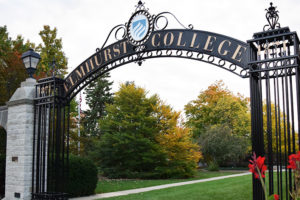
Revelation, the book of the Bible frequently cited as foretelling the end of the world and describing why true believers should be ready to depart for heaven to avoid Armageddon, is actually a guide to establishing paradise here on Earth, said noted author and New Testament scholar Barbara R. Rossing during an October 18 presentation at Elmhurst College.
Revelation is not a prediction of the end of the physical world as depicted in popular culture, Rossing said. When it was written, Revelation pulled back the veil on “the illness and sickness of the Roman Empire,” she said. Today it can be viewed as “urgent warnings” to address pressing issues, such as world hunger and climate change, before it is too late.
“Yes, it is apocalyptic rhetoric, but I’m reclaiming the word ‘apocalypse’ to say it is the vision of renewal,” Rossing told an audience of 200 in the Frick Center. “It’s not just reserved for a far-off future, after Armageddon and after the whole world is blown up. Its purpose, when it was written, was to guide the ethical life of Revelation’s readers in the present time.”
Rossing, a professor of New Testament at the Lutheran School of Theology at Chicago, is the author of the 2004 book The Rapture Exposed: The Message of Hope in the Book of Revelation. Her presentation at Elmhurst, Apocalypse Now: Revelation So No One Is “Left Behind,” was the College’s annual Niebuhr Lecture.
The Rapture Exposed was a response to the Left Behind novels, a popular series by Tim LaHaye and Jerry B. Jenkins that predicted the Rapture, in which millions of true believers in Christianity are whisked away to heaven. Those left behind are forced to fight for survival in a world consumed by massive war between good and evil.
Belief in the Rapture grew out of the writings of John Nelson Darby, a 19th-century British pastor who founded the Plymouth Brethren, a conservative evangelical sect, and laid out a series of events that warned of a coming apocalypse.
Though Darby cited Revelation and other parts of the Bible, Rossing said, “Nowhere in the Bible does this chronology get laid out. Sure, they pick and choose Bible verses and string them together to make this system, but the system itself is pieced together with Bible verses, and it is not a biblical system.”
The Left Behind books have sold 70 million copies. Some were made into movies, and they are part of the action-adventure genre of fiction that dwells on disaster and world destruction. Rossing’s concern is that many people don’t view the books’ themes as fiction. She cited one poll in which 59 percent of Americans said they believe the events in Revelation are going to come true.
Apocalyptic warnings abound today: Some Christian preachers declare the Rapture is near, and the news is filled with stories of financial collapse, environmental ruin and a dwindling supply of fuel, food and water, said Rossing, who majored in geology as an undergraduate student and is an avid environmentalist.
“We … need to take [these warnings] seriously,” she said. “But is this the apocalypse? Are we living at the end of the world? I want to say a definite no, but I don’t think I can say the same kind of easy ‘no’ that I would have 20 or 30 years ago.”
Rather than accept such warnings as predictions of imminent—and inevitable—doom, we should see them as calls to action, Rossing said.
“Apocalyptic lenses can reveal important truths to us about the world, including exposing cracks in our world that we don’t always want to see,” she said. “My thesis is that apocalypses can help us, and Revelation is a book of hope, of ethical engagement.”
But it’s the horrific disasters and bloody battles described in Revelation that have become embedded in popular culture, as grist for books, movies and video games that depict a world in which a “divinely ordained World War III” is carried out between Jesus and the anti-Christ.
“I’m alarmed at this violence, this hijacking of the message of the book of Revelation,” she said. “This is not the Jesus I know, and it’s not the Jesus who is the lamb in the book of Revelation, who conquers not by killing people but by giving his life.
“The heart of the Bible, the heart of Revelation is not Rapture or Armageddon but God’s healing of the world. It’s a vision for life beyond empire.”
The best way to combat the widespread but inaccurate perceptions of Revelation is to present it as a story of hope.
“We need a novel that tells the story not as escape or destruction. It has to be a story just as thrilling as the Left Behind novels, but instead of carrying guns to battle the anti-Christ, our band of heroes carries something else,” she said, urging students to lend their creativity to such an endeavor.
“We need a story urgently that can speak to our vision, that can speak to our imaginations for a future that’s God’s renewed world on this earth. Who can write such a story? How about one of you?”